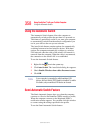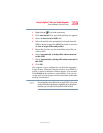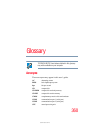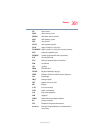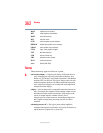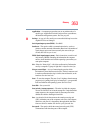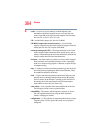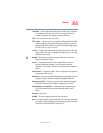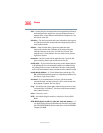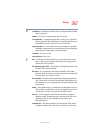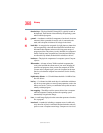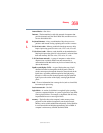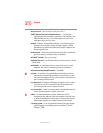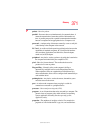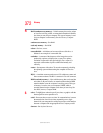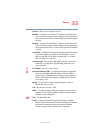
366
Glossary
5.375 x 8.375 ver 2.3
disk—A round, flat piece of material that can be magnetically influenced
to hold information in digital form, and used in the production of
magnetic disks, such as diskettes and hard disks. Compare disc. See
also diskette, hard disk.
disk drive—The device that reads and writes information and programs
on a diskette or hard disk. It rotates the disk at high speed past one or
more read/write heads.
diskette—A thin, flexible disk in a protective jacket that stores
magnetically encoded data. Diskettes can be removed from the
computer and come in two sizes: 5.25-inch and 3.5-inch. Your
computer uses 3.5-inch diskettes. See also double-density diskette,
high-density diskette.
document—Any file created with an application and, if saved to disk,
given a name by which it can be retrieved. See also file.
double-click—To press and release the primary control button adjacent
to the pointing device or mouse button rapidly twice without moving
the pointing device or mouse. In Windows, this refers to the pointing
device left control button or left mouse button, unless otherwise stated.
double-density diskette—A 3.5-inch diskette that can hold up to 720
KB of information (half the capacity of a high-density diskette). See
also diskette, high-density diskette.
download—(1) In communications, to receive a file from another
computer through a modem or network. (2) To send font data from
the computer to a printer. See also upload.
drag—To hold down the mouse button while moving the cursor to drag
a selected object. In Windows
®
, this refers to the left mouse button,
unless otherwise stated.
driver—See device driver.
DVD—An individual digital versatile (or video) disc. See also DVD-
ROM.
DVD-ROM (digital versatile [or video] disc read-only memory)—A
very high-capacity storage medium that uses laser optics for reading
data. Each DVD-ROM can hold as much data as several CD-ROMs.
Compare CD-ROM.



